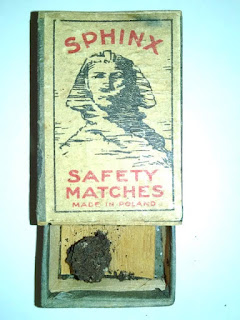A Little Piece of Home
Jeremy W Kilar
Wladislaus (Walter) Kilarski arrived in the U. S. on June 16, 1914, just 12 days before the Archduke Franz Ferdinand was assassinated, the event that soon started World War I. He was accompanied by his mother Luise, his younger brother, Mieczislaw (Mitchell), and two younger sisters Dormicel (Decillia) and Emilie. Their father, Jan Kilarski, who had arrived in October 1913, was a minor officer in the Austrian Emperor’s army and probably fled Poland well aware of the oncoming war. According to family legend, Jan had to flee Austrian-Poland because he possessed some illegal weapons. Walter Kilarski was 9 years old when he arrived in the U.S. and the family settled in Saginaw, Michigan. Walter carried with him a matchbox in which he had placed soil from his Polish home in Cieszyn. He was aware that he probably would never return to Poland and in a way this was part of the “old country” that he would always have with him. Although he never asked his sons to bury a part of Poland with him, on Walter’s and his brother Mitchell’s death a bit of matchbox soil was placed in each casket.

As a youth in Saginaw, Walter attended Holy Rosary Catholic School, served as alter boy and worked several odd jobs. In 1921, at 16, a troubled relationship with his father prompted him to run away and join the navy. He remained in the navy, serving aboard the USS Arizona when it was assigned to the Pacific Fleet in 1921. After being honorably discharged in 1925 he returned to Saginaw, coached boxing at the local Polish Falcons club and in the early 30s journeyed to Cambridge Springs, PA. to attend Alliance College, a college founded by the Polish National Alliance. There he met Sophie Jaworek from Erie PA. They were married in Erie in 1935, and ran a small confectionary store on the east side of Detroit during the Depression. Walter eventually became a tool and die designer in the local auto industry until he retired. He valued and emphasized education to his three sons who attained graduate degrees. Throughout the years, Walter kept his matchbox in a small metal box in the top drawer of his highboy dresser. It was out of reach of his three children and, although infrequently, when the matchbox was asked about, he would relate stories of his early life. Walter was a Pole who wanted to be an American. He shortened his last name, and his children could frequently hear him reciting Edgar Allen Poe’s poems perfecting his accent-free English. He became a Mason, a bowler, and competitive chess player. His sons were brought up not as Polish-Americans, but just as “Americans.” Only later in life did he “rediscover” his roots and develop a renewed pride in his heritage. Walter died in 1984, and with him was buried a part of his ancestral homeland.